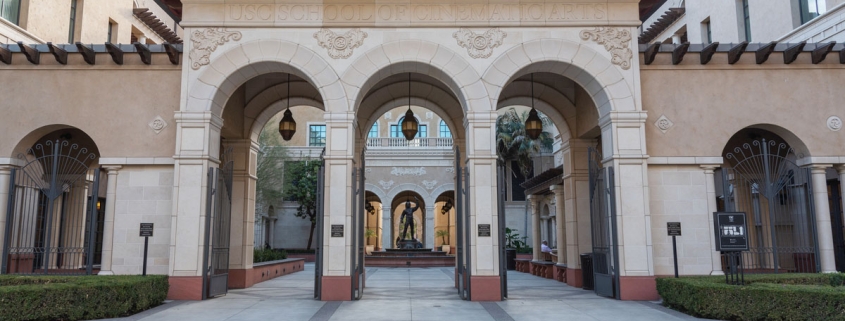SCA adopts stricter attendance policy

When screenwriting majors filed into School of Cinematic Arts classrooms to begin their spring classes, they were greeted by a new policy: Beginning this semester, SCA John Wells Division of Writing for Screen and Television would no longer distinguish between excused and unexcused absences. Instead, all absences would decrease students’ course grades by 10% per absence after the second absence. Two late arrivals also count as one absence per the policy.
Previously, unexcused absences decreased a grade by half a letter following the second unexcused absence. Excused absences did not affect a student’s grade; however, students had to provide the appropriate documentation for a professor to excuse the absence.
In response to the policy change SCA students drafted an official complaint to the SCA dean and writing vice chair in a petition delivered Jan. 16.
Junior Gia King also took to social media to voice frustrations with the attendance policy change, she called on students to sign the petition which she contributed to.
In the letter, students including King and senior Roma Murphy, called the policy harsh and detrimental to students’ mental and physical health and their ability to observe religious holidays.
According to the student petitioners, in response to the petition, SCA said it would send an email to students clarifying the policy; however, the school has not yet done so.
SCA writing vice chair David Isaacs told the petitioners that the policy was intended to grant students greater freedom regarding absences by removing the standard of proof concerning what qualifies as a legitimate absence. It was not enacted to force students to attend classes.
Dean Elizabeth Daley did not respond to request for comment regarding the policy change in time for publication.
However, the petitioners said they remain skeptical about the policy’s implementation. They emphasized the importance of excused absences in the letter, stating that it is unfair to ask that students jeopardize their mental and physical well-being to attend class. This semester, the department is not taking into consideration the reason behind an absence. This includes excuses such as religious observance and health issues, which did not typically count against a student in the past.
“In an environment as high-stress as SCA, in which students work full-time jobs on top of taking full courseloads, it is imperative that students have the chance to rest,” the petition read. “Of course, it would be optimal if that time of rest did not have to come during class hours, but students should be free to take that time if necessary, as we discussed in the memorial meeting last semester.”
Nine students died over the course of last semester, three of whom were SCA students. SCA students have since vocalized concerns regarding the University’s mental health resources and their accessibility, calling out the school’s competitive culture.
In a December Daily Trojan Letter to the Editor, Alyssa Callahan, then an SCA senior, cited Intermediate Production, an upper-division production course that is often labeled as a source of great stress for its students. Callahan wrote that professors prioritize projects over students’ mental well-being.
Murphy, who is majoring in writing for screen and television, emphasized the importance of balancing academic responsibilities with well-being.
“People shouldn’t have to choose between their grades and their health,” the petitioners wrote said. “Mental health needs to be a priority for SCA and USC as a whole. Students’ lives are at stake.”
Finley Brown, a sophomore majoring in writing for screen and television, said he was upset when he saw the new attendance policy on his syllabus this semester. Despite sometimes missing class for extracurricular activities and health issues, Brown said attendance typically did not impact his class performance.
“My grades are very important to me, and in many of the classes I’ve had where attendance has been an issue, they’ve all been ones where I’m also able to keep up with the course load without physically being present in class,” Brown said. “My physical presence is now such a bigger part of my grade, which makes my student life a lot more stressful.”
Brown also said the department implemented the policy at a time when students are still recovering from last semester’s mental health crisis. He said the new rule enforces stringent requirements for students while letting professors off easy.
“It’s kind of frustrating because, within a week’s worth of practice, I’ve had two professors miss a total of three classes,” Brown said. “It feels like we’re being held to a different standard of excused absences for them [professors], but for us, we don’t get that luxury.”
Screenwriting professor Bonnie Garvin, who has taught at SCA since 2004, said a policy that does not permit student absences is unnecessary and that students should have more control over their education.
“Requiring people to come to class is a good thing, on the other hand, I don’t want to take away the student responsibility,” Garvin said. “You’re paying a lot of money, and if you want to be in this business, you had better learn to show up. ”
Garvin also said that students have the right to appeal to the department about the policy change.
“Students are much more apt to complain than when I went to school, which is probably because students feel more free to complain,” Garvin said. “They’re paying for it, they have every right.”
Students said they feel the policy reinforces a toxic atmosphere and negatively impacts the student body.
“There’s a line in there that says ‘an absence is an absence,’ underlined and bolded,” Murphy said. “In my experience, a lot of professors in SCA use that kind of rhetoric to sort of promote this really unhealthy culture. A lot of professors will say, ‘If you’re sick, come in anyway’ … ‘The industry won’t wait for you, so you gotta do it anyway.’”
The students said the policy may also pose a serious risk to students with autoimmune diseases, whose lives could be threatened by the presence of contagious illnesses.
Mandating students to prioritize class attendance over personal health disregards the importance of self-care and taking adequate time to recover from illness, Murphy said.
“A big contributor to anxiety is the feeling that small mistakes will lead to intractable consequences for one’s future,” Murphy wrote. “If arriving late to class or missing class is enough to lower one’s grades … I predict an uptick in the degree of anxiety experienced by students.”

